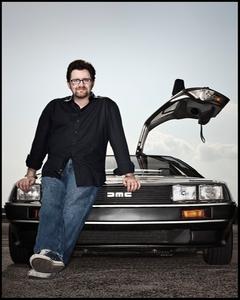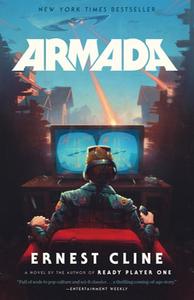
|
|
| photo: Dan Winters | |
Ready Player One became a hit, with its mashup of video games, 1980s pop-culture references, and time-honored story of the nerd who makes it big. Author Ernest Cline is having a similar experience in the real world as his first novel is set to become a motion picture made by one of his childhood heroes, Stephen Spielberg.
Armada (Broadway Books, $16 paperback), Cline's second novel, is a fantastic summer read--full of fun storytelling with a serious message of how humanity might survive a first contact scenario. When Zack Lightman realizes that his elite video gaming skills have prepared him to take on the invading alien horde, he has to think past everything he's been taught about the bad guys in order to save humanity itself.
Cline took time out of a busy promotional schedule to talk with Shelf Awareness about Armada, sudden success and his inspirations.
Was writing your sophomore effort, Armada, different from writing your breakout hit, Ready Player One?
It was completely different. With Ready Player One, the whole time I was writing it, I wasn't even sure I could get it published. I wasn't even sure I could write a book that has Mega Godzilla fight Ultraman and not get sued by all those people. I never imagined it would be a bestseller or that it would be assigned at universities or translated to other languages. It's crazy. That changed everything for the second book because it was my first experience of writing a book under a deadline. Also, the movie rights were sold and as soon as I finished the book, I would have to write a screenplay adaptation for Universal Pictures. Not only was it going to be published, thousands and thousands of people were going to read it, it stood a good chance of becoming a movie, and people were waiting. It was my first time ever having the experience of people on social media saying, "When's your next book coming out?" It's the best problem to have, but still it's a whole element of pressure that I never expected.
You have to go where the muse leads you, so I tried to keep that in mind when I was writing my second book, knowing that it was going to be viewed with expectations, whereas Ready Player One could just be a surprise.
Ultimately, I tried to put myself in the shoes of someone buying this book: What would I want to get out of the story and what would please or delight me as reader? Then trying to execute that. That's what I did for Ready Player One--not expecting anybody to like it at all.
Armada is a whole different animal because most people wanted a sequel to Ready Player One, I think. That wasn't the idea that I had, though, or what I was most excited about to write. For me, writing a book is really hard and takes over a year. This book took me almost two years to write. For me to focus on something that long, I have to be passionate about it and interested in the story, the characters, and everything I'm writing about. The only way I could write any kind of book under those circumstances is to be writing something I believe in and that I'm interested in and enthusiastic about, which incorporates all the stuff I'm interested in at the time. I couldn't have written any other book as a follow-up. That was the place that I was in.
Are there any real-life analogs for the video games within Armada?
I have a bunch of inspirations for Armada, but one of the first one's a video game that I have here in my home, Battlezone, which came out in 1982.  I love Battlezone.
I love Battlezone.
Oh, Battlezone is so great. It is a great game, and it was so realistic. Despite its rudimentary hardware and graphics, the U.S. Army bought it from Atari and paid the original programmer, Ed Rotberg, to reprogram it into a tank training simulator called Bradley Trainer to train real soldiers to operate the Bradley fighting vehicle, which was a new, light armored tank they developed at the time.
I remember reading this story in a video game magazine in the early '80s, and it just rocked my world because from the very first time I started playing video games--which was Space Invaders in 1977--they felt like simulators to me. It was a way to live out my fantasy of being Luke Skywalker. Space Invaders was directly inspired by Star Wars, so I was fascinated by Space Invaders after seeing Star Wars; my whole childhood was obsessed with it. The video game industry, to some degree, was heavily inspired by Star Wars, Space Invaders, Asteroids, Star Raiders, Starmaster and Star Fire. All these early video games were inspired by people who had seen Star Wars and wanted to re-create that feeling inside a video game. My brother and I would build a cockpit out of couch pillows in front of the TV and pull our Atari inside and pretend it was a space ship. That is such a natural thing, I think, for anybody who plays video games to imagine. What if this was real? What if I could really learn to do whatever this video game is teaching me? Another big influence is the novel Ender's Game, which was the first science fiction book I ever read.
Fantastic novel.
Yeah, the book came out in 1985. Also around the same time, in 1984, The Last Starfighter came out. I love that movie so much.
One of the most disappointing things about my childhood was that there was no The Last Starfighter video game. Is that not the biggest lost opportunity in the history of video games? You left that movie wanting to play that game so badly. I found in my research for Armada that the reason they never made one was because they made a prototype and it was going to cost $30,000 a unit to build. There was no amount of quarters that you can put into the game to justify building it. In the movie, it promises in the end credits: "Watch for the video game from Atari," but it never came.
Another inspiration for Armada is my younger brother, a major in the Marine Corps; he's an Explosive Ordnance Disposal technician. He has shown me some of the drones they use to disarm bombs in Iraq and Afghanistan remotely with telepresence robots that have remote hands used to disarm these things from a safe distance. The controls to these drones look like video game controllers.
They do that on purpose because it lowers the learning curve for soldiers who've grown up playing video games. They can just pick up one of these controllers and intuitively do that. They do that with all of the quadcopter drones now, too.
Why do all first-contact stories turn into explosions? You have some of that in the book, but ultimately, you've built a more nuanced take in Armada.
The reason it always turns into that is because that's what we like at the movies. We like watching stuff blow up. We like watching Independence Day-type stuff.
I've always loved alien invasion stories, all the way back to War of the Worlds and all the different tellings of War of the Worlds. First-contact stories are always amazing to me, so it was a way to have all my cake and eat it at the same time.
And actually be thoughtful and intelligent about it, right?
Yeah, thank you. And not have it end with you kill the most aliens and you win--let it be an examination of human nature. I worry about that sometimes. As a science buff and fan, I'm so proud of everything humanity has accomplished in this short amount of time. But because of science fiction, some part of you ends up being disappointed that we haven't accomplished more. It's 2015; we should have hover boards and flying cars.
There's such a difference between written science fiction and popular media science fiction. You could bridge the gap with this novel.
Thank you. You can have smart, fun science fiction films, too, but they are few and far between. It's usually one or the other. You have smart, thought-out science fiction or you have big, bombastic things-blowing-up science fiction but never in between. I'm trying.
You've got to have both.
Yes, you have to have both. A lot of people tell me I did it. It's weird because I don't know that Armada has the same broad appeal that Ready Player One does because to appreciate Armada and what I was trying to do, you have to almost be a student of science fiction or have been a fan of science fiction books and films for a long time to pick up on all the tropes I was trying to play off of and put a new spin on. I also tried to make it work as a straightforward story for people who had not grown up with that stuff. I'm still figuring out whether or not I succeeded.
When I sat down to write Ready Player One, it's not like I was trying to accomplish any of the things that book has accomplished. I was just trying to please myself. It's like whenever people sit down to write a song, they're always trying to write a good song or the best thing that they can. --Rob LeFebvre, freelance writer and editor

